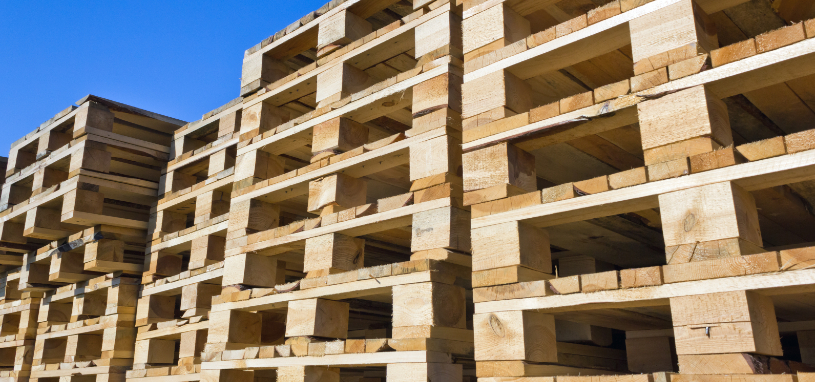Picking the right time to recycle your used pallets
Pallets are an essential part of the logistics process for businesses in all industries. In fact, they are so important that it is estimated that there are almost 10 billion pallets in circulation worldwide. That's one for every human, with around 2 billion to spare.
Although pallets are important, they are expendable. They degrade over time and require refurbishment. Sometimes, a broken pallet cannot be salvaged, and deserves one final use as part of a recycling project. Identifying pallets for recycling can be tricky, but will ensure that your workforce stays safe.
Ready to recycle your pallets into used wooden pallets? Plain Pallets is committed to providing sustainable pallet recycling solutions. Learn more about our practices in our Environmental Policy.
Why recycle pallets?
First and foremost, pallets take up space in landfill. It's estimated that in Sydney alone, over 140,000 tonnes of pallet timber enters landfill every year. Extrapolate this over the whole of Australia, and the waste is alarming.
Recycling pallets has a range of benefits to both businesses and the environment. These include:
- Keeping personnel safe from damaged pallets
- Promoting less reliance logging for pallet wood
- Lowering carbon footprints through less manufacturing
- Creating less dependence upon plastics
Before these benefits can be reaped, it's up to business owners, project managers, and other staff to identify pallets for recycling. Broken pallets can lead to serious injuries around the workplace.
How to identify pallets for recycling
With a few simple steps, you can identify which pallets you should keep and which pallets you should give away for recycling. All you really need to get the job done is a keep an eye over pallets as they come into your workplace. A great way to keep on top of it is to train your staff in performing daily spot checks on pallets.
1. Keep an eye out for nails
Nails protruding out of old pallets can mean that the timber has rotted or degraded beyond the point of reuse, pushing the nail outwards. Some of this damage may be hidden in the core of the timber. Test the tensile strength of the board close to the nail, and be careful not to injure yourself.
2. Identify rotting timber
Over the course of a pallet's lifecycle, it will come into contact with moisture from a variety of sources, including humidity, wet weather, and cleaning materials. Over time, this moisture can lead to the rotting and degradation of the timber. Fortunately, rotting timber can be recycled as mulch for gardens.
3. Check for pests
Pests are always a good indicator that it's time for the timber pallets to be recycled. Termites, white ants, and horntails will render a pallet unsuitable for the workplace. The presence of rodents, birds, and other larger pests also indicates that the pallets aren't being used enough, and should be recycled.
4. Review the pallet's history
You can only glean so much about a pallet from a physical inspection. Some pallets have been in circulation for years, and will have a storied history of use. If you can track down the source of a pallet, you can better understand what it was used for, and if it is potentially ready for recycling.
When pallets aren't fit for recycling
There is a range of reasons why pallets aren't able to be recycled. These largely relate to the timber being rendered unsafe in the course of their lifespan. Throw out your pallets if:
- They have been refurbished by an amateur
- They have been affected by chemical spills
- They do not meet Australian and international standards
- You no longer need them
Even idle pallets can be dangerous to your employees. If they aren't being used frequently, they need to be stored securely, or given over to a pallet recycling business for disposal.
How Plain Pallets can help
At Plain Pallets, we have two priorities — workplace safety, and environmental sustainability. Fortunately, our business allows us to prioritise both at once. By supplying us with your old pallets, you can keep your employees safe while we keep the environment free from unnecessary waste.
When it comes to recycling pallets, we can do three things:
- Refurbish them to create used wooden pallets for continued use in logistical operations
- Recycle the timber for home DIY projects and similar uses
- Turn them into free mulch for gardens or to go around playgrounds
Regardless of what we decide to do with them, you can rest assured that our work is backed by our comprehensive Workmanship Guarantee.
Plain Pallets is here to help you recycle your pallets into used timber pallets. Get in touch with us, or learn more about our responsibility practices in our Environmental Policy.
Must Read
Plain Pallets on 29 April 2014
How to Get Greater Mileage out of Your Pallets
Do your pallets go the distance? If not, you may be losing money through replacement costs and damaged goods. Get the most out of your pallets ...
Read morePlain Pallets on 11 March 2014
Plain Pallets Display the Future of Sustainability
Pallets are always useful. See the many ways old pallets can be reused. Who knows, maybe your next house or business will have some great pallet furniture! ...
Read more